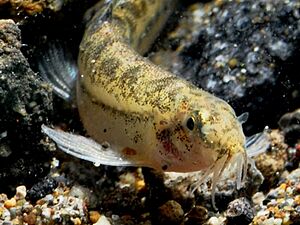Lepidocephalichthys hasselti facts for kids
Quick facts for kids Lepidocephalichthys hasselti |
|
|---|---|
 |
|
| Lepidocephalichthys hasselti from Banyumas, Central Java |
|
| Conservation status | |
| Scientific classification |
|
| Kingdom: | Animalia |
| Phylum: | Chordata |
| Class: | Actinopterygii |
| Order: | Cypriniformes |
| Family: | Cobitidae |
| Genus: | Lepidocephalichthys |
| Species: |
L. hasselti
|
| Binomial name | |
| Lepidocephalichthys hasselti (Valenciennes, 1846)
|
|
| Script error: The function "autoWithCaption" does not exist. | |
| Synonyms | |
|
|
Script error: No such module "Check for conflicting parameters".
The Hasselt's Loach (Lepidocephalichthys hasselti) is a small, freshwater fish. It belongs to a group of fish called loaches. You can find it in rivers and streams across parts of Asia and Indonesia. This little fish usually grows to about 45 millimeters (about 1.8 inches) long.
It was named after Johan Coenraad van Hasselt, a Dutch scientist. He explored the Dutch East Indies (now Indonesia) in the 1820s and drew this fish.
What It Looks Like
The Hasselt's Loach has some special features that help scientists tell it apart. It often has a black spot that looks like an eye. This spot is usually found near the base of its tail fin. Sometimes, this spot might just be a darker area instead.
This fish is small, growing up to 45 millimeters long. Its body often has a dark stripe running along its side. Above this stripe, there is usually a lighter, uncolored area. Its back might have blotches or fine spots. The tail fin usually has three to six dark vertical stripes.
Where It Lives and Its Status
The Hasselt's Loach lives in many countries across Southeast Asia. You can find it in places like Burma, Thailand, Laos, Cambodia, and Vietnam. It also lives in Yunnan (a part of China). Further south, it is found in Peninsular Malaysia and western Indonesia. This includes islands like Sumatra, Borneo, and Java.
The IUCN (International Union for Conservation of Nature) has listed this fish as "Least Concern" (LC). This means that its population is stable, and it is not currently at risk of disappearing.
 | Lonnie Johnson |
 | Granville Woods |
 | Lewis Howard Latimer |
 | James West |


